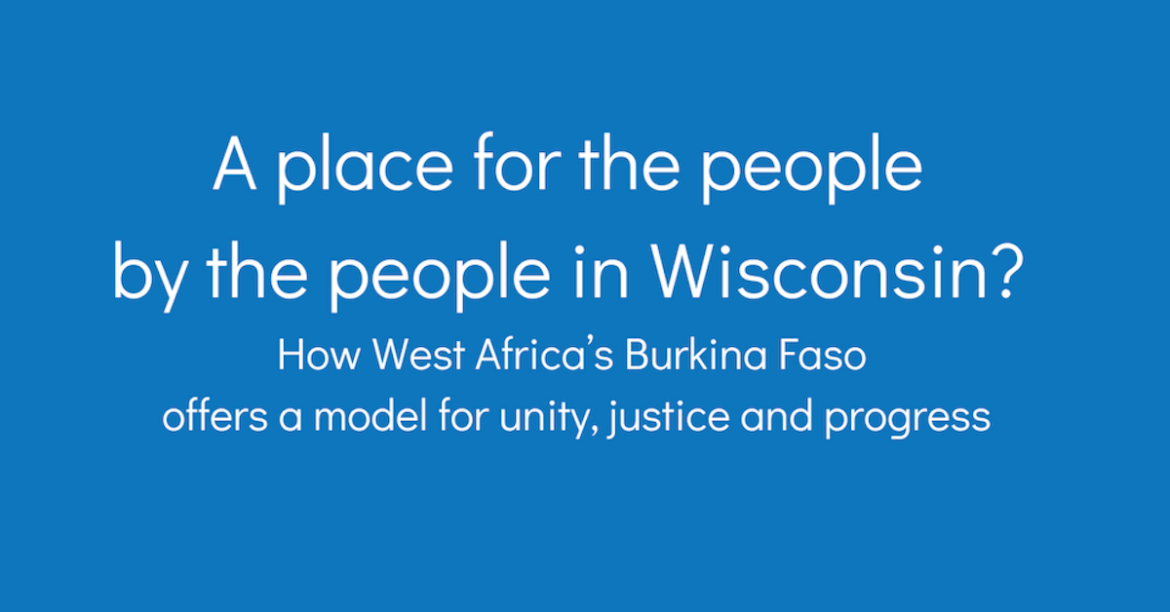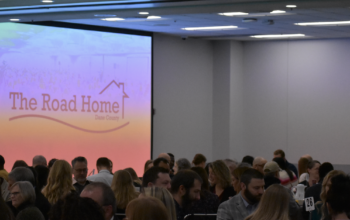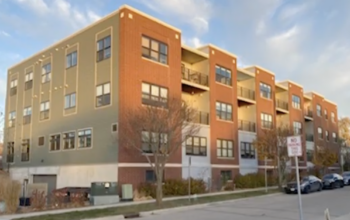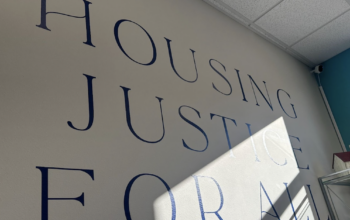Elie Wiesel, a Holocaust survivor who endured unimaginable horrors as a Jew under the Nazi regime, once said, “There may be times when we are powerless to prevent injustice, but there must never be a time when we fail to protest.” His words endure and remind me of the importance of protests leading to better and definitive solutions. Our city, Madison, is known for being a place of protests, but these gatherings have occurred all over – from UW–Madison’s library mall to the Capitol Square to East Washington.
I think we can do better. And I turn to my hometown in the west African country of Burkina Faso and a single town commons there called the Place of the Nation.
I am proposing that we transplant this Place of the Nation here to Madison in an attempt to bring people together and cultivate a sense of community by providing them with a place where they could gather for diverse events—not only political but also cultural occasions to celebrate life through prayers, festivals, art exhibitions—in a way that makes them feel connected to each other when they either stand against all oppression or celebrate life.
What exactly is the Place of the Nation?
Located in the middle of Ouagadougou, the capital of Burkina Faso, the Place of the Nation is an open public area like a town square of approximately 27,000 square feet. Its location provides easy access from all the sides of the city, and it cannot be missed. This place is a large terrace, bordered by standing concrete blocks connected by heavy chains.
Next to it is an inserted map of the country showcasing the politico-administrative division of the country and the national symbols. The symbolic gathering place evokes to the people of Burkina Faso values including unity, justice, resilience and sacrifices, together with awareness, progress, celebrations and prayers.
The Place of the Nation is where Burkinabé people stood as one against all oppression and imperialism. The Place of the Nation has long been a rallying point for political protests, including the 2014 overthrow of President Blaise Compaore after 27 years in power and the demonstrations that led to the ousting of Presidents Damiba, Ouédraogo, and Yameogo.
Beyond politics, it is also home to religious events like Eid prayers and vibrant cultural celebrations, from festivals and art exhibitions to lively street markets filled with the sounds, sights and flavors of Burkina Faso. Rich in history, the Place of the Nation symbolizes our country’s unity, resilience and the sacrifices made for justice, serving as both a space for reflection and a celebration of life.
In the United States, it seems to me that individualism is praised over unity. An American version of the Place of the Nation, which I might call the Place of the State, could provide a gathering point for the inhabitants to reflect together and build a historical, socio-political and cultural capital that would allow a greater sense of unity—a place of awareness of the people by the people, regardless of their differences.
The Place of the State can be used by the people to stand against any type of injustice and counterbalance the powerful government through nonviolent and consistent protests. It can also be the ideal place to celebrate the community, the differences between us and life in general through colorful and lively festivals.
Having the chance to live in Burkina Faso during crucial turning points of its history and now living in Madison, I believe that transplanting the Place of the Nation to Wisconsin could present advantages including more political awareness, cultural exchanges, economic opportunities and new perspectives.
Making the case for a Place of the State in Madison
Political debates in the United States are held and decided in the Congress. There is no large open place serving as a gathering place where people en masse could express their choices in a way of influencing the Congress’s decisions as it happened during the Boston Tea Party in 1773 or the Women’s Suffrage Parade in 1913.
By providing a gathering point for a larger group to demonstrate more force, such a place could have played a decisive role during manifestations including the disparate Black Live Matters Movement as well as the Act 10 protests in Madison in 2011.
The different events held at Capitol Square in Madison tend to bring people together, but it is only typically in small groups, so less impactful. Furthermore, the Capitol Square does not inspire and connect Wisconsinites the way the Place of the Nation does to Burkinabè.
Digital disconnect
The rise of social media has had a significant impact on the communities. It is true that it facilitates greater connectivity across distances by providing faster communication. But it also raises concerns including cyberbullying, privacy violations, misinformation spread and potential negative effects on mental health.
According to Marium Fahim Khan in his publication “The negative effects of Social Media and Strategies for healthy Engagement” in 2024, social media causes social isolation, polarization and echo chambers. Excessive social media use can sometimes lead to decreased real-life interaction and feelings of isolation and algorithms on social media can create filter bubbles where users are only exposed to views that align with their own, leading to increased social division and decreased open dialogue.
The Place of the State could play a decisive role by providing the people a place to unite in person instead of online, share their experiences, accept their differences and build a community based on their aspirations. It would also be a place where one could access real information avoiding misinformation of the social media and help people understand situations better by seeing genuine expressions of those around them.
Political, cultural, economic benefits of the Place of the State
The Place of the State could facilitate community building through mass communions and mass celebrations. By sharing experiences, we can create a sense of community among people with similar interests and better integrate people of different backgrounds and origins. It would introduce new customs, traditions and perspectives; foster global understanding and develop greater appreciation for diverse cultures.
Some differences that a central “place” might solve include:
- Racial segregation: Milwaukee is one of the most segregated cities in the United States, and Madison is considered one of the worst places in the country to be Black, according to the Race to Equity Report. Some people living north of Wausau have never met a person of color in their entire lives. A central gathering space could create shared experiences across racial lines.
- Rural-urban divide: Wisconsin’s rural communities often feel disconnected from its urban centers, leading to mutual mistrust and stereotypes. A central “place” could bridge this gap by hosting events that highlight the strengths and challenges of both rural and urban life, such as agricultural fairs alongside tech expos. It could also serve as a hub for collaborative problem-solving on shared issues like healthcare access and economic development.
- Town-gown divide: The divide between the state universities and rural areas is a long-simmering tension. A central space could encourage engagement in a whole host of ways.
- Red-blue political divide: Wisconsin is a true swing state politically and deeply polarized. A central “place” could provide neutral ground for productive dialogue, bringing together people with differing perspectives to discuss common goals and shared values could create respect and collaboration.
In addition, implementing such a place in Wisconsin can have an economic impact in its new location. As a tourist attraction, the Place of the State can stimulate more economic growth. According to the Wisconsin Department of Tourism, Wisconsin tourism generated $25 billion in economic impact and supported over 178,000 jobs across various sectors in 2023. This data illustrates very well the important place of tourism on the economy, hence the impact of a new tourist attraction such as the Place of the State.
Exposure to different approaches can spark new ideas and inspire creative solutions in various socio-cultural and economic sectors, including businesses and jobs creation.
Possible challenges
Building the Place of the State in Wisconsin would require financial investments and perhaps require a structural and architectural reorganization of the city.
The construction will potentially cause road closure and other inconveniences to the inhabitants of the city.
This type of project will also involve tree cutting, a necessary evil in the construction of a huge terrace that provides easy access from all the sides of the city.
Transplanting the Place of the Nation to Wisconsin could be perceived as a cultural appropriation by some people. The Place would lose a bit of its authenticity during the process and cause a misunderstanding within the receiving community due to differences in social norms and infrastructures.
To be successful, it is crucial to acknowledge the cultural origin of the Place of the Nation and adapt elements appropriately to fit the new context. It is essential to have community engagement. Involving local communities in the process can help ensure that the imported concept aligns with their needs and values.
A place for celebration
My experience living in Burkina Faso taught me that humans are not good at living in autarchy. We are social beings, and we feel a natural need to be together. We need each other to feel a certain well-being, express ourselves and experience happiness. We are all connected somehow and tend naturally to regroup in community.
What would be the world without values such as love, compassion, respect, consideration, sympathy, charity, tolerance and justice? These values are learned and implemented when we are physically together in the community. We must be collaborators in building a better common living place. By simply being to others what we want others to be to us, we give a meaning to humanity.
Let’s build, then, the Place of the State here in Madison to symbolize and celebrate such an ideal.
Souleymane Nikiema, an Odyssey Projects alumni (2024), witnessed the major historical events that shaped the vision of Burkinabe, the people of Burkina Faso, and the future of the country. He strongly believes that unity despite differences is a key to a betterment of the world. He is a self-employed carrier at Sonik Express LLC.





